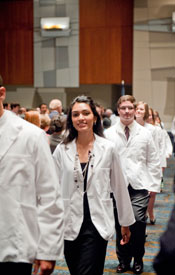There are 200 new medical students on the MCV Campus this week. These students were chosen from more than 6,450 applications — our highest number ever, and an incredible increase from the 4,200 applicants to the school in 2005.

The selection of the Class of 2015 involved more than one year of work by Michelle Whitehurst-Cook, M.D., associate dean for admissions, and the Admissions Committee. Each individual was chosen for their accomplishments and, even more important, their potential.
In this age of health care reform, it is potential that occupies all our minds. We face a projected shortage of physicians in the primary care fields and face much uncertainty over the medical profession at large. For the moment, there is no national plan on the horizon to fix the global workforce problem. And so I believe that our solutions will have to be local. That is the argument I have made in an article published in the summer issue of the Richmond Academy of Medicine’s newsletter.
In it, I describe our school’s plans for encouraging primary care careers, teaching population disease management and forging interdisciplinary training with nursing, pharmacy and allied health that will help to build consensus over scope of practice. Our school already has made progress on these and other fronts, always with our commitment to our patients at the core of our planning.
That message of patient-focused care is what we wanted to impress upon the Class of 2015 at last week’s White Coat Ceremony. This year’s keynote speaker was Internal Medicine Professor Peter A. Boling, M.D., and there is no one better able to inspire future physicians with the message of what a privilege it is to care for patients in times of illness and distress.
Boling joined our school’s faculty after completing his internal medicine residency training on the MCV Campus in 1984. In the early 1990s, he began making house calls, carrying a practice load of several hundred patients, some of whom he has now treated for more than a quarter century.
He champions the house calls approach at the national level and, in a very personal way, here on the MCV Campus. He leads our school’s program that provides in-home primary care for more than 5,000 home-bound, frail adults. It is through his program that each one of our medical students is introduced to this approach to patient care.
Boling could have educated his White Coat audience with a plethora of stats supporting the value of house calls. But instead he told a story. Of a 97-year-old woman who is a master gardener and a retired teacher whose accomplishments sometimes landed her in the local newspaper. These are pieces of her life, he told his audience, of which he would have never learned, except that he visited her in her home.
In her home, he tracked and treated her chronic illness. In her home he met her adult daughter who serves as her care-giver. And it was in her home that he built a years-long relationship with the two of them.
They returned the favor at our White Coat Ceremony when they took the stage to share their wisdom with our medical students. They exhorted the students to listen to their patients, and reminded them that caring for patients sometimes extends to caring for the whole family.
But nothing spoke more strongly than their very presence on the stage, standing alongside the physician who has grown to know them so well.
______________________
Read Dean Strauss’ article published in the Richmond Academy of Medicine’s summer issue of its newsletter, Ramifications: The Physician Workforce: A National Problem Requiring Local Solutions.

Jerome F. Strauss, III, M.D., Ph.D.
Dean, VCU School of Medicine
Executive Vice President for Medical Affairs, VCU Health System